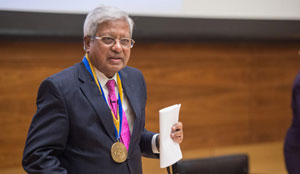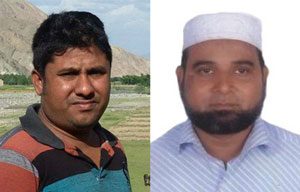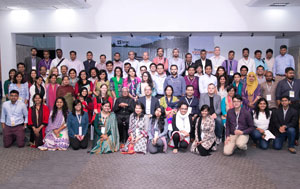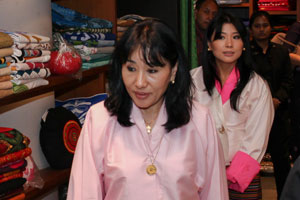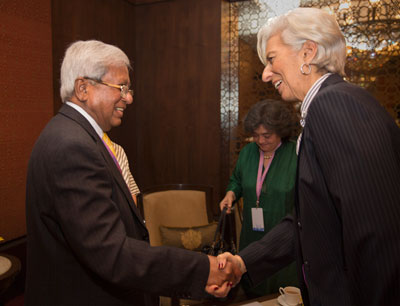
News (828)
Sir Fazle Hasan Abed receives Thomas Francis, Jr. Medal
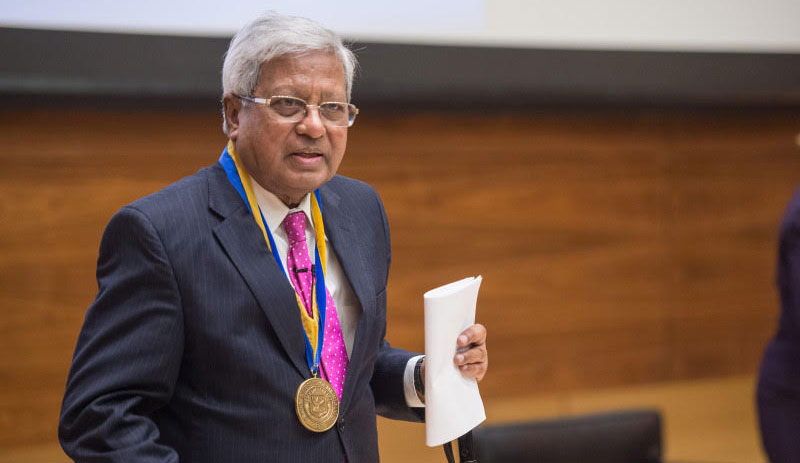
Sir Fazle Hasan Abed, KCMG, founder and chairperson of BRAC, was given the Thomas Francis, Jr. Medal in Global Public Health award by the University of Michigan. Mark Schlissel, president of University of Michigan presented the medal at a ceremony at the Ross School of Business on April 6, 2016.
Sir Fazle has been recognised for his advancement of global public health and work to establish a healthier future for people living in poverty worldwide. The medal, periodically awarded to a global leader whose work addresses the most pressing global health challenges, honours the legacy of the University of Michigan epidemiologist who mentored Dr Jonas Salk in his development of the polio vaccine.
"It is indeed a great honour to receive the Thomas Francis, Jr Medal in Global Public Health," said Sir Fazle at the award ceremony. "It gives me tremendous pleasure and I thank the University of Michigan for bestowing this prestigious award on me."
"In global development, it is not a lack of new and bright ideas that is impeding progress but rather our ability to implement these ideas well, effectively and at scale," said Sir Fazle. "There is much excitement today about the potential of new technology to end human poverty. This can make us forget that many solutions already exist. We can reach millions more today by focusing less on 'what' and more on 'how'."
In the 1970s, BRAC pioneered a new approach to treating diarrheal disease in Bangladesh. Known as Oral Rehydration Therapy (ORT), BRAC reached 12 million mothers almost entirely through person-to-person education, revolutionising health delivery in the country. Bangladesh now has the world's highest ORT usage rate, providing a case study in how to do a good thing better. In addition, between 1990 and 2011, Bangladesh saw a two-thirds reduction in mortality rates for children under the age of five. As a result, the country met the 2015 health standard set by the United Nations.
Today, BRAC breaks the cycle of contamination caused by limited access to toilets, latrines and safe water sources, especially in rural areas. Nearly one in three people worldwide – 2.5 billion – don't have access to adequate sanitation and nearly one in nine people – 800 million – don't have access to clean water.
By focusing on innovation, technical assistance, and community-based education, BRAC water and sanitation for health (WASH) committees have reached 38 million people, largely in rural areas of the country.
BRAC officials abducted in Afghanistan have been released
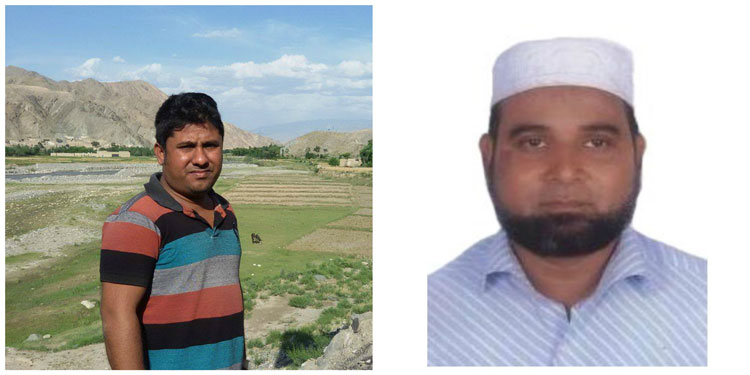
BRAC Afghanistan's staff KM Sirazul Islam (left) and Mohammad Swakat Ali (right)
Two Bangladeshi BRAC officials abducted in Afghanistan have been released after 18 days. Both Haji Swakat (50), and Md Sirajul Islam Sumon (37) returned unharmed to BRAC Kabul office on the morning of April 4.
Regional director of BRAC International, Asia, Jalal Uddin Ahmed said, "The release was ensured through the mediation of the local Surah leaders. We are very happy on their safe return. Both have spoken to their respective families in Pabna." Jalal Uddin Ahmed went to Kabul right after the abduction on 17 March.
Executive director of BRAC International Faruque Ahmed said, "We are relieved that our colleagues are safe and unharmed. From the very beginning ensuring their safe release was our top priority and I am glad that we have been able to achieve this. We are grateful to the families for their patience during the last two weeks." He also thanked both the governments of Afghanistan and Bangladesh, provincial governors, police and Surah leaders of Baghlan and Kunduz provinces for their relentless support in this critical time.
Haji Swakat and Md Sirajul Islam Sumon were abducted from Kunduz, Afghanistan on 17 March on their way back to Baghlan office after a field visit.
BRAC holds Frugal Innovation Forum 2016
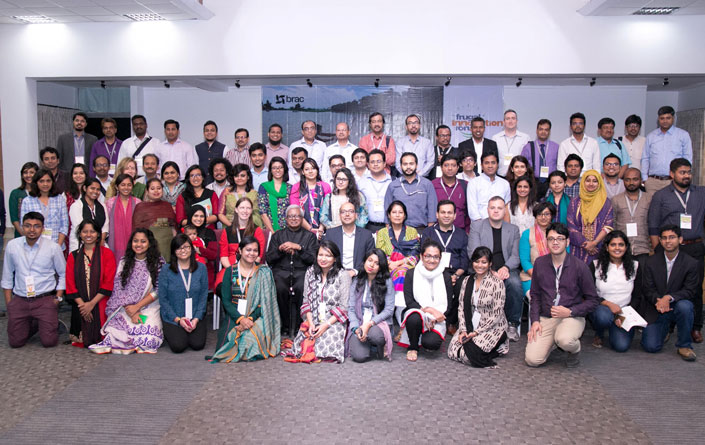
BRAC held the fourth Frugal Innovation Forum from 23-24 March 2016 in Savar, Bangladesh with the theme of scaling resilience. The forum showcased financial, social, and technological innovations that non-governmental organisations and other implementers are using to strengthen communities that are facing the effects of climate change.
The forum was designed to explore effective innovations and create opportunities for dialogue among leaders in the global south. Speakers from organisations that are building resilience in innovative ways, such as Goonj, iDE Nepal, The Mojolab Foundation, and Medic Mobile were featured in panel and plenary discussions. In addition, representatives from various grassroots organisations and thought-leaders on the subject including Ainun Nishat, Jaideep Prabhu, Rizwana Hasan and Arif Jebtik also presented and highlighted ways to build resiliency in the face of natural and man-made disasters.
“Resilience-building mindsets and creativity at the community and government level are necessary for communities to not only cope when faced with disaster, but to thrive,” Jaideep Prabhu said during the opening session. Mr. Prabhu said that top-down policies need to be balanced with grassroots, bottom-up solutions to build resiliency ahead of disaster.
The major sessions included financial innovations to foster household resiliency, innovations in adaptive livelihoods and agriculture, and also explored how policy can strengthen communities ahead of natural disasters in South Asia.
The two day long forum ended with a session with BRAC founder and Chairperson Sir Fazle Hasan Abed moderated by Mr Prabhu. The discussion mostly focused Bangladesh’s growth in the last few decades. Highlighting some of them Sir Fazle said that Bangladesh’s life expectancy at birth is higher than that of Pakistan and India although both the countries have higher per capita income than Bangladesh. But unfortunately, the country has a long way to go in terms of ensuring gender equality and meeting the growing demand of urbanisation.
Two BRAC officials abducted in Afghanistan

BRAC Afghanistan's staff KM Sirazul Islam (left) and Mohammad Showkat Ali (right)
18 March 2016, Dhaka. It is with great regret that we announce that Engineer Mohammad Showkat Ali, Chief Engineer, National Solidarities Programme and KM Sirazul Islam, Regional Accountant, Girls Education Challenge (GEC) project were abducted on 17 March 2016 from Shenowari of Baghlan e Markazi district under Baghlan province in Afghanistan. The incident happened when they were returning to Kunduz province BRAC office from a scheduled field visit.
BRAC is fully engaged in dealing with this crisis. BRAC Afghanistan authorities are in constant communication with the law enforcement agencies and the local administration and also has dispatched a team to Baghlan to coordinate the rescue efforts.
In immediate response, Ministry of Foreign Affairs of Bangladesh and Ministry of Interior of Afghanistan have assured their full cooperation.
BRAC officials in Bangladesh have been in communication with the families of Showkat and Siraz, keeping them informed of the latest situation and providing all necessary support.
BRAC has been in operation in Afghanistan, the first country presence of BRAC International, since 2002 helping the country to rebuild after the war. It currently runs programmes in health, girls education and is a partner of the Afghan Government in their National Solidarity Programme initiated to rehabilitate 5000 villages in Afghanistan. Its total budget for 2016 is about 15 million USD and it has a staff of 857 with about 61 of its staff being from Bangladesh and rest being from Afghanistan.BRAC's Afghanistan operation has reached 5.6 million people so far. For more information on our Afghanistan programme, click here.
BRAC is working all out to ensure a safe and speedy release of its abducted staff members.
Queen Mother of Bhutan visits BRAC
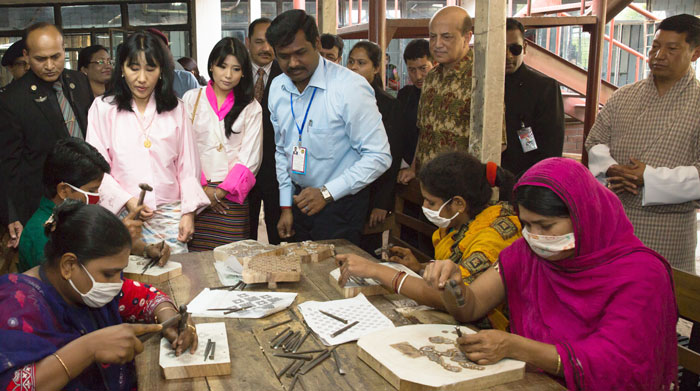
Her Majesty the Queen Mother Ashi Tshering Pem Wangchuck of Bhutan visits BRAC on her first trip to Bangladesh. As President of the Bhutan Youth Development Fund (YDF), Her Majesty is here for a five-day study trip to explore possibilities for collaboration between BRAC and YDF.
On Tuesday, 15 March, Her Majesty met with Sir Fazle Hasan Abed, the founder and chairperson of BRAC, at BRAC Centre. Admiring Bangladesh she said, “I am very impressed to see Bangladesh’s growth. I can see the discipline and it’s phenomenal.” She added, “We are very keen to collaborate with BRAC. It is remarkable that BRAC has touched so many lives and we have so much to learn from BRAC’s success.”
Thanking Her Majesty, Sir Fazle said, “Bangladesh is on the path to increase development growth rate. Last year it was 6% and we are hoping this year it would be 7%. But still 20% people live in poverty and BRAC is working to eliminate poverty and provide equal opportunity to all. We will be happy to collaborate with YDF”
In the evening, Her Majesty met the Honorable Prime Minister Sheikh Hasina at the Gonobhaban.
Her Majesty and YDF officials visited BRAC’s Ayesha Abed Foundation production centre and the Aarong Flagship Outlet on 16 March, Wednesday.
Her Majesty the Queen Mother was accompanied by Her Royal Highness Ashi Chimi Yangzom Wangchuck, the Vice President of the YDF, Ambassador of Bhutan to Bangladesh Her Excellency Pema Choden, YDF officials, and officials from the Royal Bhutanese Embassy in Dhaka.
Sir Fazle joins Advancing Asia conference in Delhi
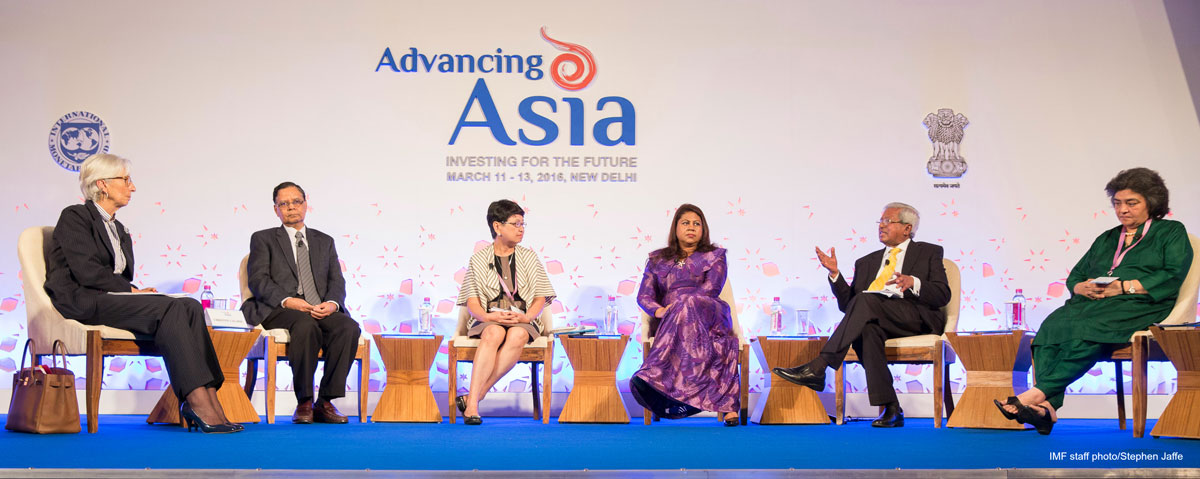
BRAC's chairperson Sir Fazle Hasan Abed joined a panel discussion today, 12 March, on Income Inequality, Demographic Change, and Gender at the three-day-long Advancing Asia conference in Delhi, India. He was joined by Milwida Guevara, CEO of Synergeia Foundation, Philippines, Arvind Panagariya, Vice Chairman of NITI Aayog India, Azeema Adam, Governor of Maldives Monetary Authority and Zia Mody, Partner, AZB and Partners, India. The session was moderated by Christine Lagarde, the managing director of the International Monetary Fund (IMF).
Watch the session here.
Learn more about Advancing Asia Conference here.
Safe Spaces for Women at Workplace
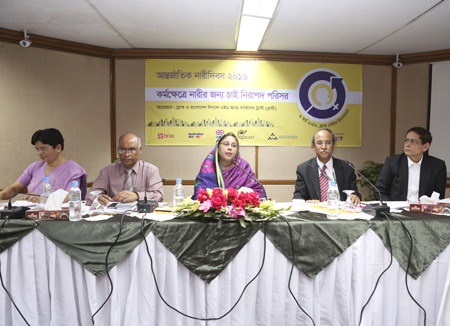
“Ensuring safety at workplace can help increasing women’s participation in the working sector” -said state minister of MoWCA Begum Meher Afroze Chumki, MP
State minister for Ministry of Women and Children Affairs (MoWCA) of Bangladesh Government, Begum Meher Afroze Chumki, MP, emphasised on women’s safety at work place to increase women’s participation, at a national dialogue today. The dialogue titled “Safe Spaces for Women at Workplace” was jointly organised by BRAC and Bangladesh Legal Aid Services Trust (BLAST) to mark International Women’s Day 2016.
As more women are participating in work outside home than ever before, ensuring safety for women at their workplaces has now become one of the most pressing agendas. Although the High Court issued a directive in 2009 to prevent and provide protection against sexual harassment at all workplaces, compliance with this directive is still not up to the mark. The dialogue was organised to start a conversation among private sector organisations to address the issue.
Barrister Sara Hossain from BLAST highlighted the nature of sexual harassment and what are the barriers for women to complain against it. She also put emphasis on the high court directive on sexual harassment redressal in her presentation. She said, “Even after seven years of the high court directive on sexual harassment redressal, it has not been made a law. In addition to this, the conditions or exact penalty in case of non-compliance with the directive is still not clear.” In her presentation she also stressed that the guideline only talks about the women, there is no mention of the third gender.
Maheen Sultan, visiting fellow of BRAC Institute of Governance and Development made a presentation on “Addressing sexual harassment in the garments sector: Good practices and findings”.
BRAC’s programme head of human rights and legal aid services (HRLS) Sajeda Farisa Kabir’s presentation addressed BRAC’s experience and learning in Addressing sexual harassment in the workplace. BRAC has more than a decade of experience in addressing sexual harassment issues at workplace, providing support to its 112,934 national staff, working in 64 districts and more than 8,000 staff working in 11 countries.
Present at the event were representative from private sector organisations like Nestle Bangladesh, Afroz, Incepta. The dialogue was moderated by BRAC's executive director Dr Muhammad Musa.
Rebuilding Livelihood of the Ebola Affected Petty Traders project
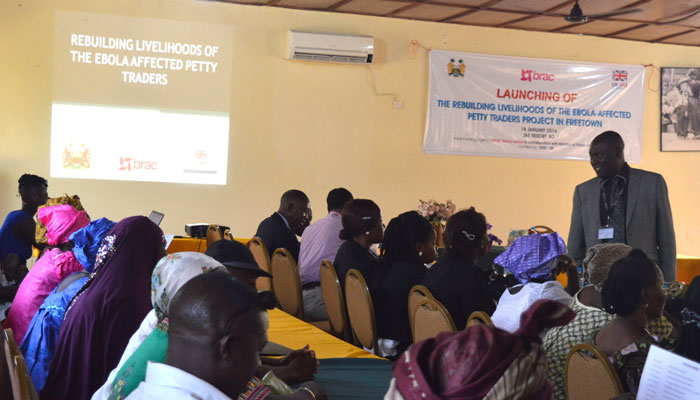
BRAC Sierra Leone in collaboration with the Ministry of Trade and Industry launched the Rebuilding Livelihood of the Ebola Affected Petty Traders project at Njala Venue, Freetown on 8 January. As part of the project, sensitisation sessions were rolled out in different parts of the country where the project will be implemented; briefing key stakeholders on the different components of the project and creating awareness.
The project is funded by DFID and executed by a consortium consisting of BRAC, World Vision, World Hope International and Catholic Relief Services (CRS). BRAC Sierra Leone will cover 12, 036 beneficiaries in 4 districts; CRS will cover 6,110 beneficiaries in 3 districts and World Hope International will cover 3,441 beneficiaries in 2 districts. The main objective of this project is to support 29,400 petty traders affected by Ebola through soft loan, start-up business capital and capacity building training. It also aims to recapitalise micro finance institutions to ensure access to finance by petty traders and also long term sustainability.
Primary education in Bangladesh goes digital
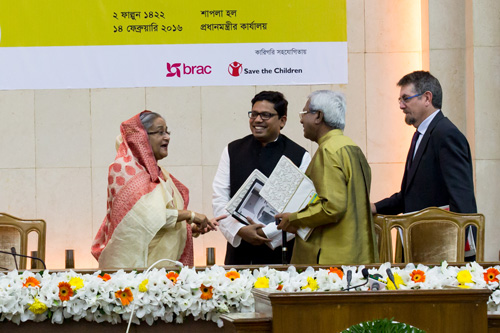
Prime Minister officially launches new interactive digital multimedia content to cover entire primary school curriculum
“Emphasis has been given to ensure taking tech-based education system to every corner of the country,” said Prime Minister Sheikh Hasina today at the official launch of the new, interactive digital multimedia content. The digital content covers the entire curriculum of primary education (grades 1-5) and will be accessible on any device.
“To improve the quality of education, we have developed this new interactive multimedia content that will be accessible from any corner of the country,” the PM said.
Through this initiative, all of Bangladesh’s twenty million primary school students will be able to access their entire curriculum online via any device. In public schools, it is being accessed on the computers that the government has already integrated into over 1,500 digital classrooms across the country as part of its Digital Bangladesh vision.
Promo video
Present as a guest Minister of Primary and Mass Education Advocate Mostafizur Rahman, MP said, “We have already prepared 55 PTIs with multimedia projectors and they have developed interactive content. They have also trained the teachers on the content. We are training teachers on the use of multimedia projectors, digital devices as well.”
The government initiated to transform 17 books made by National Curriculum of Textbook Board (NCTB) into interactive multimedia digital education content a decade back. The multimedia content creates an innovative and engaging learning environment, moving away from the traditional teacher-centric classroom.
It was developed in response to the success in classrooms of the content previously developed by BRAC to cover Grades 6-10. The new content was funded by the Government of Bangladesh and created by BRAC and Save the Children.
Explaining this as a revolutionary initiative, state minister of ICT Mr Zunaid Ahmed Palak, MP said, “The multimedia based interactive digital content is an approach to make education more interesting and fun for children. So far, we have made multimedia classrooms in 5,000/1500 schools and we plan to reach 65,000 by 2021, thus contribute creating a digital Bangladesh”
According to research, visuals improve learning by up to 400 percent, and now those visuals will be available anywhere in Bangladesh that an internet connection can be found. Every screen, in a country where over 50 million people are online, will now be a space where families can experience fun, animated learning.
Congratulating government BRAC founder and chairperson Sir Fazle Hasan Abed, KCMG said, “BRAC has always emphasised on education from its beginning. We started our “Computer aided learning” project in 2005 to bring technology in education sector. We appreciate the government for adopting our learning and taking it all over the country. It will change the education scenario in future”.
Amongst other distinguished guests, present at the event were secretary of primary and mass education Md. Humayun Khalid, secretary of ICT Shyam Sunder Sikder, Interim Regional Director South/ Central Asia of Save the Children Mr Michael McGrath.
Interactive multimedia content is available here: http://digitalcontent.ictd.gov.bd/
To find more about BRAC’s education porgamme visit: http://education.brac.net/
Watch the event coverage here: http://www.brac.net/live
BRAC won the Amplify/OpenIDEO Urban Resilience Challenge!
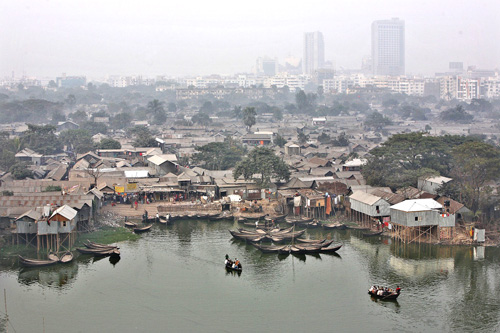
BRAC has won the Urban Resilience Challenge launched by Amplify/OpenIDEO. The idea submitted by the BRAC Urban Development Programme (UDP) for this challenge is among the 8 winning ideas which were selected from a total of 350 submissions globally. BRAC UDP’s idea involves developing community-led fire prevention and response mechanisms in the urban slums of Bangladesh.
OpenIDEO is an online collaborative that enables people from all over the world to collaborate in developing innovative solutions to pressing social and environmental challenges. OpenIDEO runs the Amplify programme which focuses on improving the lives of the billion people living in extreme poverty around the world.
Amplify will fund BRAC UDP up to 800,000 USD for a 12 months project. Amplify will also support BRAC UDP to build capacity on human-centred design approach to problem solving and develop prototypes.
The idea submitted by BRAC UDP for the Amplify/OpenIDEO Urban Resilience Challenge can be viewed in detail here -
https://challenges.openideo.com/challenge/urban-resilience/wining-ideas/community-led-participatory-disaster-management-system-to-reduce-risk-of-fire-hazard-in-urban-slums-of-bangladesh
Join the world’s biggest family

